英语精读3
现代大学英语精读3(第二版)Unit9-课文翻译及课文知识重点

Book 3 Unit 91.be seated 坐着take a seat 坐下;就坐save/reserve a seat 留座位2.decorate with 以…装饰3.light up 照亮;点亮p on 敲5.take tea 品茶6.flap at 拍打7.out of proportion to sth 不成比例8.linger over 徘徊9.as it were 似乎10.roll over 转过身来11.put his head in her lap 把头枕在她腿上12.the air of …的样子(姿态)13.hover over 在…盘旋;俯身14.lean over 俯身15.break in 插嘴16.lean back 背靠17.carry out 实施18.prick up its ears 竖起耳朵19.let it go 打住;停止20.That seemed to me so right. 正合我意。
21.in the pause 停顿22.breathe to 吐露23.couldn’t help doing 禁不住24.clutch at 紧握25.die down 消退26.become of 使……遭遇;……降临于;发生……情况27.be wrapped up in sb 埋头于;与……有关系;被包藏于28.snap v. 突然折断;咯哒一声关上;厉声说;给…拍照;咬(at)29.fix v. 扎牢;使牢固;安排,决定;修理n. 困境30.stretch v. 伸展,张开;时间的延续/延展开/占地面积(over);伸出n. 连续的水域;连续,延续(时间)31.beyond adj/adv 超过;另一边32.apart adv.相距;拆分(take sth apart)tell apart 区分pull apart 撕开drift apart 飘离,疏远;各奔东西fall apart 崩溃come apart 破碎,瓦解grow apart 变得隔阂;朝不同方向生长apart from 除……之外(还有/不再有);远离33.leap to one’s feet 一跃而起34.add up to 合计35.add to 增添36.agree with 适合(身体)37.set out 出发38.allow for 考虑到39.general manager 总经理40.answer for 为…负责= be responsible for41.back you up 支持你42.bear ou 证实(bear-bore-borne)43.blow up 爆炸44.count sb in 把sb算在内45.count on 指望46.without words 没有话语beyond words 难以言表at a loss for words 不知说什么好47.fade away 逐渐消失;渐渐减弱die away (风,声,光线)逐渐减弱fall down 跌倒;倒下die down (火势,怒火)逐渐平息;(植物)枯萎48.beg sb to do sth 恳求某人做plead with sb for sth 向…恳求49.tremble 由于寒冷、虚弱、愤怒或者恐惧等而发抖,站立shiver 因寒冷或情绪突变而出现的短时间的轻微和快速的颤抖shudder 着重指由于恐惧、震惊等而引起的全身突然而强烈的战栗shake (普通,含义广)人/物不由自主地颤动,摇摆,侧重剧烈,无规律50.content adj “满意的”强调安于现状/知足常乐只能做表语,不能做定语be content with /be content to do sthcontented a. 满足的satisfying a. 令人满意的,圆满的satisfactory a.令人满意的,符合要求的(事物)51.for all 尽管;虽然52.break off 中断;绝交break down (机器)发生故障;(健康,精神)垮掉,垮下来break up 分解,驱散,离异break away 挣脱,脱落53.beside 在…旁边;与…不相干on top of 在…之上;熟练掌握;另外(还有);紧接着in addition to 除…之外还有54.It be some time before 要过多久才能…55.on one’s return 当某人回来时56.be expected to do 有望做sth57.be reported to do 据报道…58.After what seemed a very long time 在经过似乎很长一段时间后After what seemed a friendly exchange of greetingsTranslation1.他们都伸长了脖子想看个究竟。
大学英语精读第三版第3册课后练习题含答案
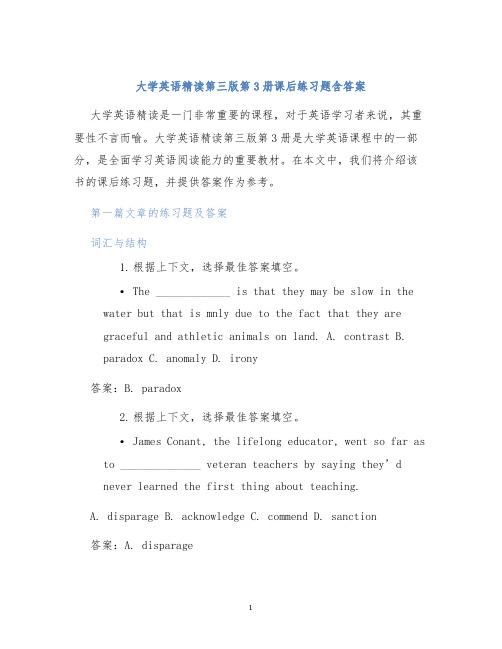
大学英语精读第三版第3册课后练习题含答案大学英语精读是一门非常重要的课程,对于英语学习者来说,其重要性不言而喻。
大学英语精读第三版第3册是大学英语课程中的一部分,是全面学习英语阅读能力的重要教材。
在本文中,我们将介绍该书的课后练习题,并提供答案作为参考。
第一篇文章的练习题及答案词汇与结构1.根据上下文,选择最佳答案填空。
•The _____________ is that they may be slow in the water but that is mnly due to the fact that they aregraceful and athletic animals on land. A. contrast B.paradox C. anomaly D. irony答案:B. paradox2.根据上下文,选择最佳答案填空。
•James Conant, the lifelong educator, went so far as to ______________ veteran teachers by saying they’dnever learned the first thing about teaching.A. disparageB. acknowledgeC. commendD. sanction答案:A. disparage阅读理解1.根据文章内容,选择最佳答案。
•According to the passage, _____________.A. pelicans are graceful and athletic animalsB. pelicans are slow in both the water and on landC. pelicans are slow in the water but are athletic animals on landD. pelicans are very fast swimmers but struggle on land答案:C. pelicans are slow in the water but are athletic animals on land2.根据文章内容,选择正确的答案。
大学英语精读第三版
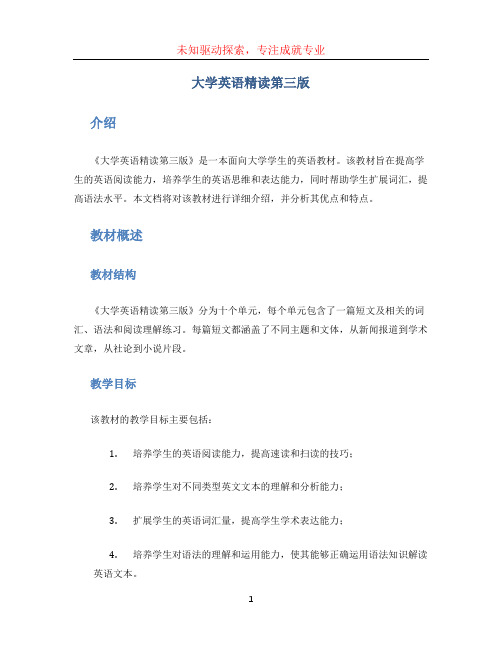
大学英语精读第三版介绍《大学英语精读第三版》是一本面向大学学生的英语教材。
该教材旨在提高学生的英语阅读能力,培养学生的英语思维和表达能力,同时帮助学生扩展词汇,提高语法水平。
本文档将对该教材进行详细介绍,并分析其优点和特点。
教材概述教材结构《大学英语精读第三版》分为十个单元,每个单元包含了一篇短文及相关的词汇、语法和阅读理解练习。
每篇短文都涵盖了不同主题和文体,从新闻报道到学术文章,从社论到小说片段。
教学目标该教材的教学目标主要包括:1.培养学生的英语阅读能力,提高速读和扫读的技巧;2.培养学生对不同类型英文文本的理解和分析能力;3.扩展学生的英语词汇量,提高学生学术表达能力;4.培养学生对语法的理解和运用能力,使其能够正确运用语法知识解读英语文本。
教材特点多样性《大学英语精读第三版》的短文多样性很强。
教材的编辑团队精心挑选了各种不同主题和文体的文章,涵盖了文学、历史、社会等多个领域。
这种多样性有助于拓宽学生的知识面,同时有助于学生对不同类型文章的理解和分析能力的培养。
渐进式难度教材的难度设计非常合理。
教材从初级到高级逐渐增加难度,每个单元的文章都比前一个单元稍微困难一些。
这种渐进式难度设计有助于学生逐步提高阅读能力,同时也有助于提高学生的学习兴趣和自信心。
独立学习教材注重培养学生的独立学习能力。
除了提供短文和练习题,教材还提供了详细的词汇和语法解释,帮助学生自主学习。
此外,教材还提供了参考答案,供学生自我检查。
实用性《大学英语精读第三版》中的短文内容丰富,贴近实际生活和学术领域,有助于学生在实际运用中提高英语能力。
教材中的词汇和语法也是实用性强的,有助于学生在写作和口语中更流利地表达自己的观点。
使用建议使用该教材进行学习时,有以下几点建议:1.按照教材的顺序进行学习,逐步增加难度;2.针对每篇短文进行多次阅读,注重对重点词汇和短语的理解;3.完成课后习题并自行核对答案,查漏补缺;4.利用课后习题及参考答案进行自主学习和巩固;5.参考教材中的词汇和语法解释,确保对学习内容的理解;6.与同学或老师一起进行讨论,分享不同的观点和理解。
现代大学英语精读3课后翻译
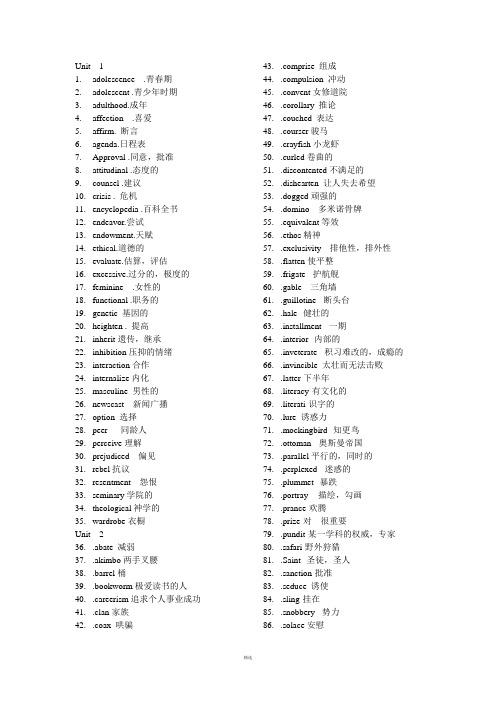
Unit 11.adolescence .青春期2.adolescent .青少年时期3.adulthood.成年4.affection .喜爱5.affirm. 断言6.agenda.日程表7.Approval .同意,批准8.attitudinal .态度的9.counsel .建议10.crisis . 危机11.encyclopedia .百科全书12.endeavor.尝试13.endowment.天赋14.ethical.道德的15.evaluate.估算,评估16.excessive.过分的,极度的17.feminine .女性的18.functional .职务的19.genetic 基因的20.heighten . 提高21.inherit遗传,继承22.inhibition压抑的情绪23.interaction合作24.internalize内化25.masculine 男性的26.newscast 新闻广播27.option 选择28.peer 同龄人29.perceive理解30.prejudiced 偏见31.rebel抗议32.resentment 怨恨33.seminary学院的34.theological神学的35.wardrobe衣橱Unit 236..abate 减弱37..akimbo两手叉腰38..barrel桶39..bookworm极爱读书的人40..careerism追求个人事业成功41..clan家族42..coax 哄骗prise 组成pulsion 冲动45..convent女修道院46..corollary 推论47..couched 表达48..courser骏马49..crayfish小龙虾50..curled卷曲的51..discontented不满足的52..dishearten 让人失去希望53..dogged顽强的54..domino---多米诺骨牌55..equivalent等效56..ethos精神57..exclusivity---排他性,排外性58..flatten使平整59..frigate- 护航舰60..gable---三角墙61..guillotine- 断头台62..hale--健壮的63..installment- 一期64..interior--内部的65..inveterate- 积习难改的,成瘾的66..invincible 太壮而无法击败tter-下半年68..literacy-有文化的69..literati-识字的70..lure 诱惑力71..mockingbird--知更鸟72..ottoman- 奥斯曼帝国73..parallel平行的,同时的74..perplexed- 迷惑的75..plummet--暴跌76..portray-- 描绘,勾画77..prance-欢腾78..prize-对---很重要79..pundit-某一学科的权威,专家80..safari-野外狩猎81..Saint--圣徒,圣人82..sanction-批准83..seduce 诱使84..sling-挂在85..snobbery- 势力86..solace安慰87..solitary-孤独的88..sprawl- 扩张89..subculture-亚文化90..supplant-取代91..sustenance.人或动物赖以生存的食物92..trickle-. 细流93..trolley. 购物车,手推车94..tsar-.沙皇95.undersung. 没受到足够重视或赞扬96..virtue- 优点97..whereas--. 尽管,然而。
杨立民《现代大学英语精读(3)》(第2版)【词汇短语+课文精解+全文翻译+练习答案】(Unit1)
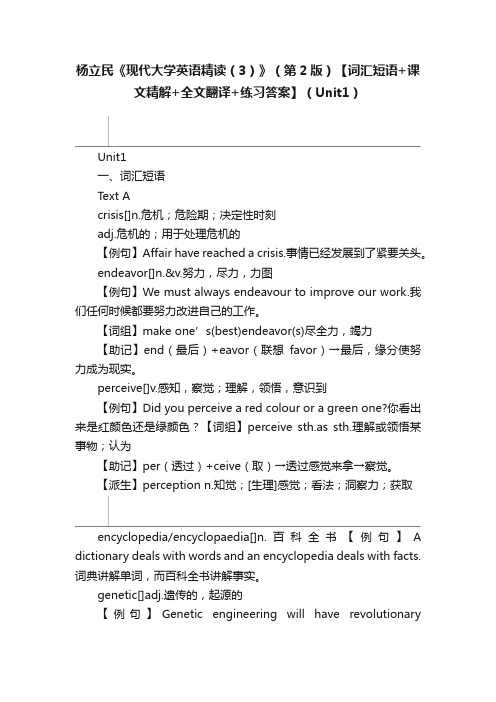
杨立民《现代大学英语精读(3)》(第2版)【词汇短语+课文精解+全文翻译+练习答案】(Unit1)Unit1一、词汇短语Text Acrisis[]n.危机;危险期;决定性时刻adj.危机的;用于处理危机的【例句】Affair have reached a crisis.事情已经发展到了紧要关头。
endeavor[]n.&v.努力,尽力,力图【例句】We must always endeavour to improve our work.我们任何时候都要努力改进自己的工作。
【词组】make one’s(best)endeavor(s)尽全力,竭力【助记】end(最后)+eavor(联想favor)→最后,缘分使努力成为现实。
perceive[]v.感知,察觉;理解,领悟,意识到【例句】Did you perceive a red colour or a green one?你看出来是红颜色还是绿颜色?【词组】perceive sth.as sth.理解或领悟某事物;认为【助记】per(透过)+ceive(取)→透过感觉来拿→察觉。
【派生】perception n.知觉;[生理]感觉;看法;洞察力;获取encyclopedia/encyclopaedia[]n.百科全书【例句】A dictionary deals with words and an encyclopedia deals with facts.词典讲解单词,而百科全书讲解事实。
genetic[]adj.遗传的,起源的【例句】Genetic engineering will have revolutionaryconsequences for mankind.遗传工程将对人类产生深远的影响。
【词组】genetic material遗传物质;基因材料genetic information遗传信息【派生】genetical adj.遗传的;起源的;创始的genetics n.遗传学【助记】gene(基因)+ticendow[]v.资助,捐赠;(with)给予,赋予【例句】Nature endowed her with a beautiful singing voice.大自然赋予她一副美妙的歌喉。
现代大学英语精读3教案

教学目标:1. 学生能够理解并掌握本单元的核心词汇和短语。
2. 学生能够阅读并理解本单元的课文内容,提高阅读理解能力。
3. 学生能够通过课文讨论和写作,提高英语口语和写作能力。
教学重点:1. 核心词汇和短语的理解与运用。
2. 课文内容的阅读理解和分析。
3. 英语口语和写作能力的提高。
教学难点:1. 部分长难句的理解。
2. 文章主题思想的把握。
3. 英语口语和写作的技巧。
教学过程:一、导入1. 教师简要介绍本单元的主题和背景。
2. 引导学生回顾上节课所学内容,为新课学习做好铺垫。
二、课文阅读1. 学生自读课文,勾画出生词和难句。
2. 教师带领学生分析课文,讲解生词和难句。
3. 学生分组讨论课文,总结文章主题思想。
三、词汇学习1. 教师讲解本单元的核心词汇和短语,并举例说明其在课文中的应用。
2. 学生进行词汇练习,巩固所学知识。
四、口语练习1. 教师组织学生进行口语练习,如角色扮演、讨论等。
2. 学生展示练习成果,教师给予点评和指导。
五、写作训练1. 教师讲解本单元的写作要求,如文章结构、语言表达等。
2. 学生根据要求进行写作练习,教师批改并给予反馈。
六、总结与反思1. 教师对本节课的学习内容进行总结,强调重点和难点。
2. 学生反思自己的学习过程,提出改进措施。
教学评价:1. 课堂参与度:观察学生在课堂上的发言、讨论和练习情况。
2. 作业完成情况:检查学生的词汇练习、口语练习和写作练习。
3. 考试成绩:评估学生对本单元知识的掌握程度。
教学延伸:1. 鼓励学生阅读与课文相关的课外读物,扩大词汇量。
2. 组织学生参加英语角等活动,提高英语口语能力。
3. 引导学生关注社会热点问题,提高写作水平。
教学时间:2课时教学资源:1. 教材:《现代大学英语精读3》2. 教学课件3. 课外阅读材料4. 课堂练习题教学注意事项:1. 注重学生的个体差异,因材施教。
2. 创设良好的课堂氛围,激发学生的学习兴趣。
3. 鼓励学生积极参与课堂活动,提高英语综合运用能力。
现代大学英语精读3

现代大学英语精读3简介《现代大学英语精读3》(Advanced College English: Reading and Writing, Book 3)是为中国高校英语专业本科生编写的一本教材,帮助学生提高阅读和写作能力。
本教材共分为六个单元,每个单元涵盖不同主题和文体,使学生能够接触到不同类型的英语文章。
每个单元都包括阅读理解、词汇学习和写作练习等部分,以帮助学生全面发展英语能力。
教材结构单元介绍教材共有六个单元,每个单元都以不同的主题为中心,包括科技、环境、文化、社会、教育和全球化等。
每个单元都包括以下几个部分:•预习任务:通过预习任务,学生可以了解本单元的主题,并提前准备相关的词汇和背景知识。
•阅读理解:以多种不同类型的英语文章为主要素材,帮助学生培养阅读和理解能力。
•词汇学习:通过词汇学习部分,学生可以掌握本单元相关的重点词汇和短语,并进行相关练习。
•写作练习:通过写作练习,学生可以提高自己的写作能力,并应用本单元的内容进行写作。
补充资源教材提供了一些补充资源,以帮助学生更好地学习和巩固所学知识。
这些补充资源包括课后习题答案、词汇表、写作指导和阅读材料的翻译等。
学习方法阅读篇章在阅读理解部分中,学生可以通过不同类型的文章提高阅读理解能力。
建议学生采用以下方法进行学习:1.预览文章:在开始阅读之前,先预览文章的标题、段落标题以及图片等信息,以便快速了解文章的主题和结构。
2.理解关键词:在阅读过程中,注意理解重要的关键词和短语。
可以使用词典或者上下文推测词义。
3.识别主题句:每个段落通常都有一个主题句,通过识别主题句可以更好地理解文章的主旨。
4.做练习题:教材提供了相关练习题,学生可以通过做题巩固所学知识。
词汇学习除了阅读理解部分,教材还提供了词汇学习部分,帮助学生掌握重点词汇和短语。
学生可以使用以下方法进行词汇学习:1.记忆词汇:通过使用词汇表和词汇练习,学生可以加深对重点词汇的记忆,并提高词汇量。
大学英语精读三
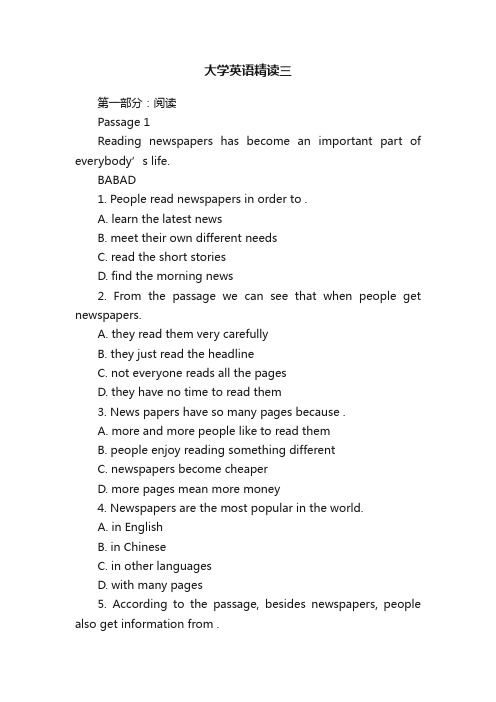
大学英语精读三第一部分:阅读Passage 1Reading newspapers has become an important part of everybody’s life.BABAD1. People read newspapers in order to .A. learn the latest newsB. meet their own different needsC. read the short storiesD. find the morning news2. From the passage we can see that when people get newspapers.A. they read them very carefullyB. they just read the headlineC. not everyone reads all the pagesD. they have no time to read them3. News papers have so many pages because .A. more and more people like to read themB. people enjoy reading something differentC. newspapers become cheaperD. more pages mean more money4. Newspapers are the most popular in the world.A. in EnglishB. in ChineseC. in other languagesD. with many pages5. According to the passage, besides newspapers, people also get information from .A. magazinesB. advertisementsC. e-mailsD. InternetPassage 2If there is any single factor that makes for success in living, it is the ability to profit by defeat. ACBCD6. The author __________.A. orders you to analyze defeatB. wants you to face defeatC. advises you to let a baby grasp a rodD. warns you not to confuse defeat with fail7. Defeat is valuable __________.A. because it is a factorB. because it isn’t defeat that makes you failC. because it provides the guide and encouragement to successD. because it is not a thing to be ashamed of8. What does the author know? ___________.A. He knows every success in lifeB. He knows the factor making for successC. He knows every man who is able to analyze defeatD. He knows the life of every man9. The person who was able to analyze the defeat is likely ___________.A. to be a successorB. to face it with feeling ashamedC. to achieve successD. to be ashamed of it10. What does the author advise one to do with the powerwhich defeat gives? One should _____.A. explore itB. explain itC. let a baby grasp a rodD. learn itPassage 3Why don’t birds get lost on their long flights from one place to another?BCBDB11. The reasons why birds don’t get lost on long flights _________.A. have been known to scientists for yearsB. have only recently been discoveredC. are known by everyoneD. will probably remain a mystery12. During daylight hours, birds _________.A. fly aimlesslyB. rely on landmarksC. use sun for guidanceD. are more likely to get lost13. By “his outdoor cousins” the author means _________.A. other experimentersB. the other doves of the same broodC. doves under the natural skyD. other birds in general14. The experiment with the dove indicated that _________.A. birds have to be taught to navigateB. a bird that has been caged will not fly long distanceC. some birds cannot fly at nightD. some birds seem to follow the stars when they fly at night15. In total darkness, doves _________.A. use landmarksB. don’t know which way to flyC. fly back homeD. wait for the stars to appearPassage 1Museums are places where collections of objects are preserved and displayed.BCBDB1. The first paragraph deals with______.A. what museums preservesB. what kind of objects museums displayC. where museums obtain their objectsD. how museums function2. Which statement is not true?A. Museums are not only storehouse for collections.B. Museums are places where you can learn something.C. Museums preserve and display only things found in nature.D. Museums carry on educational and research programs.3. Where do objects at museums usually come from?A. From auction sales.B. From art dealers and private collectors.C. From gifts and bequests.D. All the above.4. The large museums accept______.A. everything offered to themB. all the gifts and bequestsC. only objects that meet their high standardsD. only things that small museums do not have5. The last paragraph is about_____.A. the knowledge one gets from visiting museumsB. the things one can see in museumsC. the world and the people living in itD. museum collections from other landsPassage 2Cars of 2000 will travel the nation’s highways in never-before-dreams-of safety,C A/C AD B6. The author believes that cars of the future_____A. will be replaced by airplanesB. will have wheels unlike those of todayC. will use columns of air instead of wheelsD. will use wheels without tires7. Cars of the future will run_____A. without annoying noiseB. without fuelC. much more smoothlyD. on a number of fans8. The car without wheels has been called a “flying car” because_____A. it travels a few inches above the groundB. it can fly as a plane doesC. it moves at a very high speedD. it can travel over smooth water9. Where is a wheel-less car least fit to travel?A. over soft landB. over rough country roadsC. over highwaysD. over waterfalls10. Wheel-less cars will_____A. eliminate all traffic problemsB. create new traffic problemsC. eliminate parking problemsD. both A and CPassage 3Students can travel in the United States without spending too much money if they follow these suggestions.CDCAB11. The passage tells students_____.A. how to make travel plansB. how to get help while travelingC. how to use less money while travelingD. how to choose hotels12. To see more of the country, you’d better travel_____.A. by planeB. by busC. by trainD. by bike13. If you want to share rides with others, you can get information_____.A. on the blackboards in classroomsB. from school administratorsC. through certain radio programsD. from travel agents14. According to the passage, staying at youth hostels is_____.A. cheapB. convenientC. comfortableD. enjoyable15. To save money, you can_____.A. have more candy and colaB. invite your friends for a picnic]C. take some food with youD. eat in restaurants sometimesPassage 1Today a pilot is totally dependent on what the air traffic controller on the ground tells him. CCDAC1. A pilot is dependent on _______ for his safe flight.A. flightwatchB. the air traffic controller in the planeC. the command of the air controller on the groundD. the pilot himself2. __________ can help the pilot to keep contact with the air traffic controller.A. a computerB. the screenC. flightwatchD. the passage dosen’t mention it3. The flightwatch is _________ to use.A. quite simpleB. quite complexC. expensiveD. not mentioned4. the main components of the flightwatch are __________.A. a screen and certain computersB. computersC. a flightwatch map and small computersD. blobs and tails5. The computers are _________.A. largeB. neither large nor smallC. smallD. not mentionedPassage 2For most people, life is easier and more comfortable than ever before. DCDDD6. In the U.S. , families are becoming _____.A. biggerB. smallerC. easierD. freer7. Why are women able to achieve economic independence? _______A. Because they have their own salary.B. Because convenience foods are available.C. Because they are free away from drudgery.D. Because they attending college.8. Hard housework was taken away by ______.A. liberated womenB. retired parentsC. supermarketsD. modern equipment9. Which of the following statements is not true according to the text? _______.A. Women’s liberation has made it possible for them to study.B. Comfortable life adversely influences marriage in America.C. Adults can go wherever they want.D. Women prefer to be bachelors.10. The text implies that the author _____.A. highly praises the liberation of womenB. heartily enjoys this freedom and affluenceC. strongly recommends such kind of social lifeD. greatly worries about the bond of marriagePassage 3Ever since I was very small, I have had the sense that I ought to be somewhere else. CACAD11. What did the writer do as a curious child? _______A. She visited Victorian England and Tsarist Russia.B. She flew to Los Angeles, Chicago and London with her parents.C. She read all kinds of books.D. She spent lots of time traveling on trains.12. How does the author feel about travel today? _______A. She doesn’t like it very much.B. She takes great pleasure in it.C. She feels tired of it.D. She feels as excited as when she was young.13. What did the author learn from books as a child? ______A . About many foreign places.B. About many historical figures.C. About the outside world as well as her own self.D. About the ironies of life.14. We can infer from the passage that when traveling by air, the author spends most of her time on the way _____.A. reading booksB. resting herselfC. imagining thingsD. letting her spirit soar15. In this passage the author mainly talks about _____.A. the wonders of travelB. her growth from an innocent child to a learned womanC. the benefits of readingD. the difference between childhood dreams and life’s realities第二部分:词汇与结构-16. --- How long will it take to arrive in Australia?--- ________ .A. Two hours laterB. Before two hoursC. Two hoursD. In two hours17 --- ________ ?--- I have a headache, a sore throat and I’m feeling rather weak.A. What are youB. What’s the matter with youC. How are you todayD. What can I do for you18 --- Don’t you think that’s expensive?--- ________ .A. Not at all. That’s the best price in townB. Believe it or not. It’s goodC. It’s impossible to cost so muchD. It’s cheap enough19 --- Would you do me a favour?--- ________ .A. It’s goodB. Th at’s OKC. I’m glad toD. No problem20 -- Please show me your library card.--- ________ .A. This is my cardB. My pleasureC. Give it to youD. Here you are21 — Could I leave a message?—______________A. Please speak.B. Say your messageC. Sure. Go ahead, pleaseD. Do what you like22. — Sorry for the inconvenience it may cause you.—______________A. You are welcomeB. Never mind.C. It’s OKD. Nothing else23. —What’s the problem?—________ .A. I have a meeting now. Do you mind if we postpo ne it to a later timeB. I have a meeting now. Do you think if we postpone it to a later timeC. I have a meeting now. How do you feel if we postpone it to a later timeD. I have a meeting now. What about if we postpone it to a later time24. — OK. Does next Tuesday suit you? .—___________A. It is a good dayB. I’m pleased.C. I’m OK.D. Yes, it’s fine with me.25. — I wonder if it is possible for us to arrange a meeting this week? —___________A. I’m afraid I can’t make it this weekB. I’m sure it’s impossibleC. There is no way.D. It’s a problem to make it..26. I ________ for two hours but nobody has arrived yet.A. am waitingB. waitedC. have waitedD. have been waiting27. Tom as well as two of his classmates ________ invited to the party.A. wasB. wereC. hasD. are28. He gave ________ answer as I did.A. as sameB. sameC. as the sameD. the same29. She glanced shyly ________ him and then lowered her eyes.A. atC. onD. with30. I would rather you ________ tomorrow than today.A. comeB. will comeC. cameD. would come31. We were ________ to leave before the train started.A. longB. keenC. worriedD. anxious32. **ended to make teaching her ________ .A. professionB. workC. employmentD. occupation33. The difference was ________ cross the river.A. where toB. how toC. what toD. which to34. Mercury freezes if it is cooled to ________ .A. a low too temperatureB. a too low temperatureC. too low temperatureD. too low a temperature35. When it ________ to table-tennis, you can never defeat him.A. goesC. aboutD. comes16. — Do you know what day is today?—______________A. Today is Wednesday.B. It is a fine day.C. It is February 11.D. It is raining.17. — My mother is ill. Could I leave tomorrow?—______________A. Good. You can go.B. Quite well. Please leave.C. No problem. Please do.D. Not bad, if you like.18. — I have never been to a Chinese village, have you? —______________A. Yes, I haven’t..B. No, I haven’t either.C. No, I have n’t too..D. No, I have.19. — When will the performance begin?—___________A. About one hour.B. After one hour.C. In one hour.D. At one hour.20. — I wonder if I could take a few days off work. —___________A. I’m sure you could leave off wor k.B. I should say a few days is no problem.C. Why, what’s the matter with you?D. No, you mustn’t go away21. We were ________ to leave before the train started.A. longB. keenC. worriedD. anxious22. **ended to make teaching her ________ .A. professionB. workC. employmentD. occupation23. The difference was ________ cross the river.A. who toB. how toC. what toD. which to24. Mercury freezes if it is cooled to ________ .A. a low too temperatureB. a too low temperatureC. too low temperatureD. too low a temperature25. When it ________ table-tennis, you can never defeat him.A. goesB. isC. aboutD. comes26. At no time during his speech ________ that he would make another film soon.A. he mentionedB. he should mentionC. did he mentionD. should he mention27. A selfish person doesn’t ________ other people’s problem.A. to careB. caresC. careD. care about28. It is necessary that ________ before 10 o’clock.A. she returns homeB. for her to return homeC .she return home D. she will return home29. The teacher had no idea ________ these two students argued about.A. whoB. whatC. thatD. why30. I’d rather you ________ say anything about it for the time being.A. don’tB. wouldn’tC. didn’tD. shouldn’t31. I had a lot of trouble ________ the car ________ this morning.A. to get; startedB. to get; startingC. getting; startedD. getting; starting32. She didn’t like to ________ the hotel bedroom with a stranger.A. shareB. liveC. stay D .borrow33. We ________ advertisements everywhere that they become largely invisible.A. used to seeingB. used to seeC. get used to seeD. get used to seeing34. You’d better ________ your luggage in case you have missed something.A. find outB. work outC. pick outD. check out35. I am ________ Florida on business.A. in my way toB. on my way toC. at my way inD. along my way forC. at my way inD. along my way for16. --- Good afternoon. I’m going to invite some friends to dinner. Please reserve a table for six at about eight this evening.--- ________A. I know, I will do it.B. I’m clear, don’t worry about it.C. Sure, it doesn’t matter.D. I see, I’ll make t he reservation at once.17. --- Come on. Let’s try the Chinese food.--- ________A. You are so kind to let me have a taste.B. Yes, I will try.C. Mm… it’s so delicious.D. They are all good food.18. --- Take a seat here, Mr. Brown. Let’s try the food.--- ________A. All right, you are very kind to let me sit down.B. Thank you. Oh, the dishes look so nice.C. I see, I will sit downD. You’re welcome.19. --- Which do you prefer, wine or sprites?--- ________A. Let me drink some wine.B. I enjoy wine.C. I like wine better than spirits.D. I’d like to have a little wine first.20. --- I’d like to cash this check, please.--- ________ .A. What kind of notes do you want?B. How do you want?C. What do you want?D. What can I do for you?21. He walked into the office and shook hands with a smiling man ________ Mr. Black.A. namingB. namedC. by namedD. calling22. The hostess ________ until the quests were seated.A. sat downB. was sitting downC. was to sit downD. didn’t sit down23. The new employee finished the report and ________ ..A. turned it inB. turned in itC. turned it upD. turned it on24. If I ________ you, I ________ that job.A. was, would takeB. were, would takeC. was, would have taken.D. were, would have taken25. I’m very interested ________ plants, animals and geography.A. onB. toC. overD. in26. A friend of mine, after 10 years of studying ballet, succeeded ________ becoming a dancer.A. inB. onC. withD. of27. With her yellow hair, Jane is ________ girl as a fairy.A. as beautiful aB. as a beautifulC. as a more beautifulD. so a beautiful28. The lake shone ________ glass in the moonlight and she _______ it very much.A. liking, likedB. liked, likeC. like, likedD. like, likes29. He was willing to do all ________ he could to help his friends.A. whichB. thatC. howD. what30. As we were leaving, we saw the ________ man and his friends entering.A. red hairB. red-hairC. red-hairedD. red-hairing31. ________ , he bought his wife a present..A. On his way to homeB. On his way homeC. In his way homeD. In his way to home32. There are scientific ways ________ which man solves problems.A. inB. withC. atD. on33. I have no idea ________ he has said about the matter.A. whichB. thatC. whatD. how34. We are looking forward to ________ the Great Wall again.A. visitB. visitingC. having visitedD. being visited35. Just for today, I’m not going to insist t hat everything I do ________ perfect.A. wasB. isC. beD. are第三部分:完形填空The United States is a land of many cultures. Its people have come from different homelands and have 36 their own customs from all parts of the world.ADDAC BAACD37. A, changed B, excited C, exciting D, changing38. A, off B, through C, in D, on39. A, about B, of C, for D, out40. A, on B, in C, with D, by41. A, much B, many C, most D, little42. A, descent B, dessert C, desert D, decency43. A, before B, in front of C, ago D, ahead44. A, residents B, delegates C, descendants D, representatives45. A, on B, under C, for D, withA few months ago, Mr. Smith and Mrs. Smith had a big problem.DBDBB CDABC36. A. make B. feel C. look D. show37. A. cut B. make C. help D. leave38. A. like B.. such C. just D. as39. A. asked B. told C. said D. phoned40. A. There’s B.. It’s C. It has D. There has41. A. However B. Furthermore C. So D. But42. A. nice B. better C. clean D. white43. A. sales B. sale C. sole D. sail44. A. see B. become C. help D. write to45. A. at B. by C. with D. underNo man can change the weather. Nobody can control the weather. CBDBA DABAC36. A. that B. which C. what D. how37. A. pick B. make C. carry D. send38. A. as well B. and C. as well as D. such as39. A. sight B. sign C. mark D. shape40. A, air B. sky C. heaven D earth41. A. by B. in C. for D on42. A. that B. which C. where D when43. A. day B. weather C. hour D. time44. A. above B. below C. important D. interesting45. A. ears B. hands C. eyes D. legs第四部分:中译英46. 除了离家比较远之外,他对新的办公室还是很满意的。
现代大学英语精读3课后答案

More Work on the TextⅡVocabulary1.Translate.(P14)1)From English into Chinese.(1)学校教职员工(10)青春期(2)政治上的成熟(11)种族偏见(3)成长过程中的变化(12)每天工作日程(4)认同危机(13)伦理道德观念(5)恋爱关系(14)处理日常生活的能力(6)遗传工程(15)历史背景(7)学术生活(16)异性(8)偶然事件(17)感情上的支持(9)民族认同(18)生活方式2)From Chinese into English.(1)to pursue an education(10)to drag one's feet(2)to acquire knowledge(11)to evaluate the result(3)to handle the case(12)to process knowledge(4)to define the word(13)to perform one's duty(5)to select one's major(14)to narrow the gap(6)to resent the treatment(15)to expand business(7)to establish their identity(16)to expect better results(8)to frustrate the students(17)to assemble cars(9)to declare war(18)to present facts2.Give synonyms and antonyms of the following.(P15)1)Give synonyms.(1)objective,purpose,end(7)choice(2)to happen(8)to choose/to pick or pick out(3)to increase/to enlarge/to grow/to develop(9)main/chief/principal/leading(4)to try/to attempt/to make an effort(10)belief(5)clear(11)strong feeling(6)magazine(12)to get/to gain/to obtain2)Give antonyms.(1)masculine(9)to exclude(2)immature(10)disapproval(3)independence(11)mistrust/distrust(4)inferior(12)inequality(5)incompetent(13)to discourage(6)minor(14)to grow/to increase/to expand/to develop(7)to narrow(15)indistinct/unclear/vague(8)innocence(16)impractical/unpractical/theoretical3.Fill in the blanks with the appropriate words in their proper forms listed below. (P15)1)handle5)observant,occurrence9)occurred, apply2)occurrence6)observation,observed,occur10)observers, handled3)handle7)involve11) involvement4)involved8)application12)observation4.Translate.(P16)1)She intends to apply for that academic position.2)He is so devoted to his research that the idea that he will soon have to retire never occurs to him.3)Many people have observed that,without effective checks,we have a tendency to abuse our power.4)Students must observe carefully how good writers use words.5)Some countries refuse to get involved in this dispute and they resent any foreign interference.6)How do you think we should handle the drug problem?7)According to the agreement,all business policies should apply to everybody without any prejudice.8)The control of the sand storms will involve a tremendous amount of work and money.9)You have to take into consideration the local conditions when you apply these technologies.10)All applicants will have to fill out this form and mail in an application fee of 50dollars.11)Based on his careful observation of children's behavior he came to the conclusion that learning is a natural pleasure.12)In a country of many nationalities,ethnic harmony requires very careful handling.13)The government is determined to punish all the corrupt officials involved.14)Cheating at exams does not occur very often.But when it does,the school takes a very tough position.5.Fill in the blanks with the most appropriate word.(P16)1)C.3)B.5)B.7)D.9)B.11)A.13)D.15)B.17) A.2)A.4)A./D.6)D.8)A.10)C.12)C.14)A.16)D.18)D.6.Choose the right word in their proper forms.(P18)1)(1)object(2)objectives(3)objective(4)objective(5)objects2)(1)requires(2)requires(3)acquire(4)acquire(5) inquire3)(1)entrusted(2)entrusted(3)trust(4)believe(5)trust4)(1)repaid(2)pay,repay(3)place(4)repay(5) placed,replaced5)(1)anxious(2)anxiously(3)eager(4)eager/anxious(5) eager/anxious7.Choose the best word or phrase for each blank from the four supplied in brackets. (P19)(1)suggested(4)but(7)eventually(10)what(13) derive(2)primarily(5)remained(8)regrets(11)where(14) lacking(3)told(6)consisted(9)pursuing(12)Although(15) droppingMore Work on the TextⅢGrammar1.Observe these sentences and identify the object of the italicized verb or preposition, and find out how it is expressed.(P20)1)them:pronoun2)who they are and what their strengths and weaknesses are:two wh-clauses3)to enter the work world:an infinitive phrase4)that there are four distinct aspects to psychological separation from one's parents:a that-clause5)where they are in the independence/dependence struggle:a wh-clause6)how to give and receive affection in the adult world:a wh-clause7)very little:pronoun8)how they react to new knowledge and new ways of learning,how they process the knowledge presented to them,and how they organize this knowledge:three wh-clauses9)shuddering:a gerund10)drifting down:a gerund phrase11)herself:a reflective pronoun12)how to let loose a plague capable of destroying whole nations:wh-word+to-infinitive13)what to say:wh-word+to-infinitive14)whether it had been storming for three or four days:a noun clause introduced by“whether”15)(need)charity:a noun;(help)themselves:a reflexive pronoun;(told) Millard:a proper noun2.Practice using correct object forms.(P21)1)Complete the sentences with one appropriate word.(1)what(3)what(5)it(7)why(9)everything(2)yourself(4)whether(6)others(8)which/how(10)much2)Choose the right form,the infinitive or the gerund of the verb in brackets,forthe blanks.(1)feeling(4)being;being/to be(7)to stay(10)being recognized(2)to change(5)to go(8)not to see(3)becoming(6)thinking(9)having fallen behind3)Translate these sentences into English.(1)In the negotiations,the two sides found they had little in common.(2)More and more old people are learning how to surf/use the Internet.(3)Don't forget to write down your name on the exam paper.(4)We must bear in mind that there is no shortcut in learning.(5)He never regretted having shifted from business to politics.(6)I’d like to have a chat with you about your term paper sometime this week.(7)Like sports,learning a foreign language requires a lot of practice.(8)They all remember where they were when they heard the shocking news.(9)People learn little from victory,but much more from defeat.(10)Whenever you face a decision you have three choices:do what you please; do what others do;or do what is right.3.Summarize how the word“way”is modified/qualified in these sentences.(P22)the way+clause=the way in which+clause:1),6)a way/the way(s)+to-infinitive phrase(referring to an activity in a specific way):2),3),8)a way/the way/ways+of+gerund noun(referring to an activity in a general way):4),5),7)But in many cases,the difference between“a/the way to do sth.”and“a/the wayof doing sth.”is blurred.The choice is rather a matter of idiomatic usage.plete these sentences by translating the Chinese in brackets,using the word “way”.(P22)1)a poet's way of telling us2)the only way to learn a foreign language well3)no easy way to say good-bye4)the way they all stared at me5)some aspects of the way we speak6)(many)ways to get data into a computer7)The way I judge it8)a way of delivering the secret message9)a way to stop the leak10)the way the children responded to their questions5.Put in appropriate determiners where necessary using a“/”when none is needed. (P23)a,his,a,his,the,an,The,the/a,a,the,the,The,the,/,The,his,the,theplete each of the following sentences with the most likely answer.(P23)1)D.3)A.5)B.7)A.9)D.11)C.13)A.15)A.2)C.4)D.6)D.8)B.10)B.12)B.14)C. (In colloquial English,A is possible for No.12.)More Work on the TextⅣWritten WorkAnswer the question in about150words.(P24)In what ways,according to the writer of the article,is college a time of growth and expansion?College life is an important period in one's life.Although the college students seldom think about that the key changes will probably happen to them during their college years.During this time,students are going through an identity crisis which includes independence/dependence struggle from their parents.And also,the most important thing is establishing their sexual identity.At the same time,these youngsters are learning how to give and receive affection in the adult world.What's more,they establish their personal and social identity.They are affirming their personal values such as religious faith,moral and ethical values and developing new ways to organize and using the academic knowledge as well as their world knowledge.In a word,college students can be growing in their understanding of themselves, others and the world in which they lives.Poem of the WeekAbout the Poet依里诺尔·法吉恩(1881-1965)生于伦敦,由私人家庭教师授课。
英语精读3教学大纲(最新)

英语精读3教学大纲(最新)英语精读3教学大纲《英语精读3》课程大纲:一、课程概述《英语精读3》是一门英语专业必修课程,旨在通过深入阅读和分析英语原版材料,提高学生的英语阅读、理解和表达能力。
本课程涵盖了英语语言、文化、文学等方面的知识,旨在培养学生的英语综合素质和跨文化交流能力。
二、课程目标1.提高学生的英语阅读、理解和表达能力,使其能够流畅阅读和理解英语原版材料。
2.培养学生的英语语言文化素养,使其能够理解和欣赏英语语言的文化内涵和艺术价值。
3.提高学生的跨文化交流能力,使其能够准确、得体地运用英语进行跨文化交流。
4.培养学生的批判性思维和分析能力,使其能够自主探究和学习英语语言和文化知识。
三、教学内容与要求本课程教学内容主要包括:1.阅读材料:选取英语原版材料,包括小说、散文、诗歌等,要求学生阅读和理解。
2.语言点讲解:讲解材料中的重要语言点,包括词汇、语法、语用等方面。
3.文化背景介绍:介绍英语语言的文化背景和历史背景,帮助学生理解和欣赏英语语言的文化内涵和艺术价值。
4.思考题与讨论:设计思考题和讨论题,引导学生自主探究和学习,培养学生的批判性思维和分析能力。
5.写作训练:要求学生撰写读后感、评论等,提高学生的英语写作能力和表达能力。
四、考核方式与标准本课程的考核方式为期末考试和平时成绩相结合的方式。
期末考试包括阅读理解、语言点测试、写作测试等;平时成绩包括出勤率、作业完成情况、课堂表现等。
考核标准将根据学生的学习表现、参与度、表达能力等方面进行综合评定。
英语六级深度阅读教学大纲英语六级深度阅读教学大纲可以从以下几个方面来设计:1.主题内容:大纲可以基于某一个主题进行设计,例如“生态环境”、“科技发展”等。
主题应该涵盖广泛的学科领域,以便于考生理解、分析、评价和表达观点。
2.词汇要求:大纲应根据主题所涉及的词汇进行设计,并要求考生掌握相关的学术词汇。
3.语法要求:大纲可以要求考生掌握相关的语法知识,如定语从句、倒装句等。
现代大学英语精读3
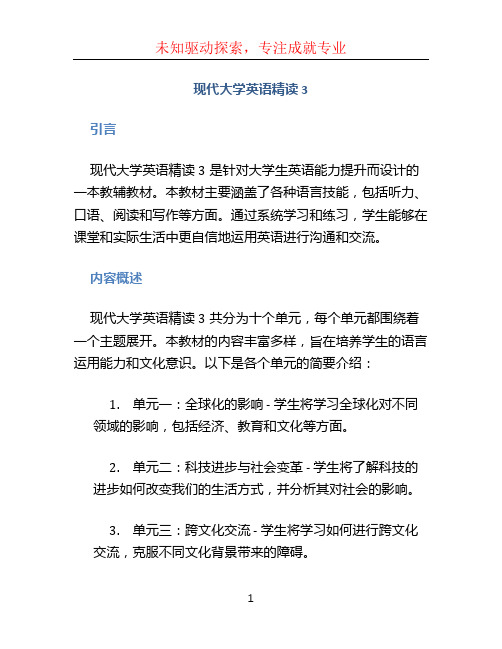
现代大学英语精读3引言现代大学英语精读3是针对大学生英语能力提升而设计的一本教辅教材。
本教材主要涵盖了各种语言技能,包括听力、口语、阅读和写作等方面。
通过系统学习和练习,学生能够在课堂和实际生活中更自信地运用英语进行沟通和交流。
内容概述现代大学英语精读3共分为十个单元,每个单元都围绕着一个主题展开。
本教材的内容丰富多样,旨在培养学生的语言运用能力和文化意识。
以下是各个单元的简要介绍:1.单元一:全球化的影响 - 学生将学习全球化对不同领域的影响,包括经济、教育和文化等方面。
2.单元二:科技进步与社会变革 - 学生将了解科技的进步如何改变我们的生活方式,并分析其对社会的影响。
3.单元三:跨文化交流 - 学生将学习如何进行跨文化交流,克服不同文化背景带来的障碍。
4.单元四:健康与生活方式 - 学生将学习如何保持健康的生活方式,并了解身体和心理健康的重要性。
5.单元五:人类行为与社会责任 - 学生将探讨人类行为的动机与影响,并思考个人和社会的责任。
6.单元六:环境保护与可持续发展 - 学生将研究环境问题,并探讨可持续发展的重要性。
7.单元七:创新与创业 - 学生将了解创新和创业对个人和社会的影响,并学习成功创业的基本原则。
8.单元八:全球旅游 - 学生将了解全球旅游的现状和趋势,并探讨旅游业对经济和文化的影响。
9.单元九:教育与学习 - 学生将探讨教育的重要性,并讨论不同教育模式的利弊。
10.单元十:媒体与社交网络 - 学生将研究媒体和社交网络对信息传播和社会互动的影响。
教学方法现代大学英语精读3采用了多种教学方法,包括听力练习、口语表达、阅读理解和写作练习等。
教材内容通俗易懂,旨在培养学生的英语思维能力和交际能力。
以下是一些教学方法的具体介绍:•听力练习:每个单元都包含有关主题的听力材料,学生可以通过听取相关录音和回答问题来提高听力技能。
•口语表达:教材提供了各种对话和口语练习,学生可以通过模仿和实践来提高口语表达能力。
现代大学英语 精读3(第三版)教学课件B3U1.pptx
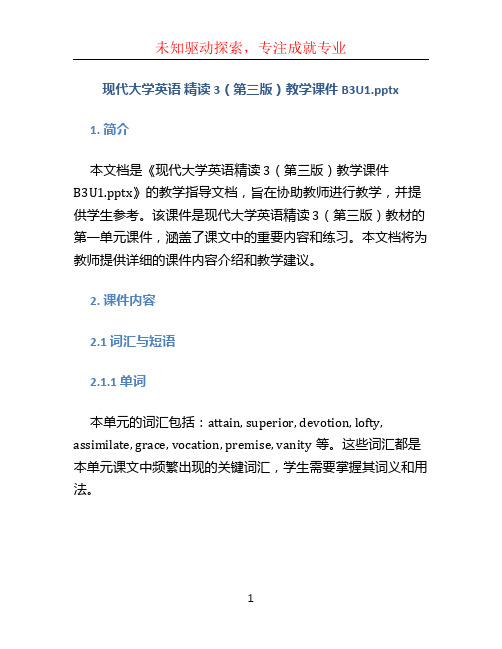
现代大学英语精读3(第三版)教学课件B3U1.pptx1. 简介本文档是《现代大学英语精读3(第三版)教学课件B3U1.pptx》的教学指导文档,旨在协助教师进行教学,并提供学生参考。
该课件是现代大学英语精读3(第三版)教材的第一单元课件,涵盖了课文中的重要内容和练习。
本文档将为教师提供详细的课件内容介绍和教学建议。
2. 课件内容2.1 词汇与短语2.1.1 单词本单元的词汇包括:attain, superior, devotion, lofty, assimilate, grace, vocation, premise, vanity等。
这些词汇都是本单元课文中频繁出现的关键词汇,学生需要掌握其词义和用法。
2.1.2 短语本单元的短语包括:be indicative of, bring out, take…seriously, measure up to, in good part等。
教师可以通过例句和实例来帮助学生理解这些短语的含义和用法。
2.2 阅读理解本单元的阅读理解部分涵盖了三篇文章,分别是《选择正确的途径》、《智慧的力量》和《忠诚的战士》。
教师可以通过课件中的题目和文字说明帮助学生理解文章内容,并进行讨论和解答相关问题。
2.3 语法与写作本单元的语法重点是介词和非谓语动词的用法。
教师可以利用课件中的例句和练习来讲解和巩固学生对这些语法知识的掌握。
此外,课件还包括写作部分,教师可以引导学生根据所学的语法知识写作相关的练习作文。
3. 教学建议3.1 教学方法教师可以采用多种教学方法来教授本单元内容,如讲解法、示范法和讨论法等。
在讲解词汇和短语时,可以先通过示范法来引导学生正确使用,然后进行讨论和实践。
在阅读理解部分,可以采用讨论法来引导学生分析文章内容,并提出自己的见解和观点。
在语法与写作部分,可以通过讲解法和实践法相结合,引导学生掌握语法知识,并培养写作能力。
3.2 学生活动教师应鼓励学生积极参与课堂活动,并提供一些学生活动的建议,如词汇卡片制作和交流、小组讨论、写作练习等。
大学英语精读第3册_课文及课后答案
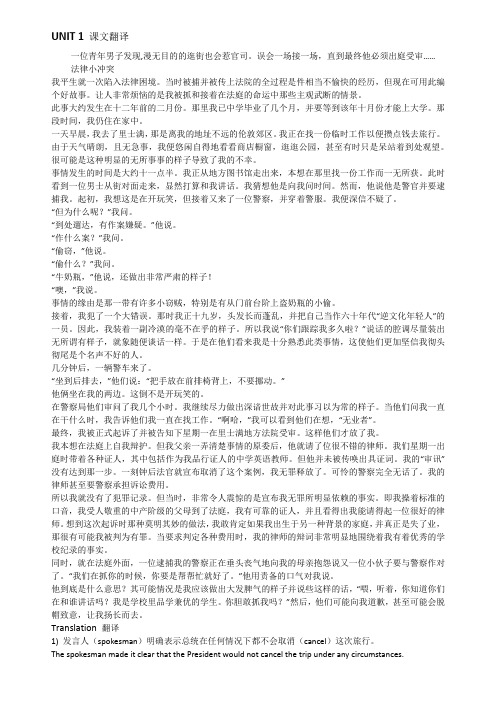
UNIT 1课文翻译一位青年男子发现,漫无目的的逛街也会惹官司。
误会一场接一场,直到最终他必须出庭受审……法律小冲突我平生就一次陷入法律困境。
当时被捕并被传上法院的全过程是件相当不愉快的经历,但现在可用此编个好故事。
让人非常烦恼的是我被抓和接着在法庭的命运中那些主观武断的情景。
此事大约发生在十二年前的二月份。
那里我已中学毕业了几个月,并要等到该年十月份才能上大学。
那段时间,我仍住在家中。
一天早晨,我去了里士满,那是离我的地址不远的伦敦郊区。
我正在找一份临时工作以便攒点钱去旅行。
由于天气晴朗,且无急事,我便悠闲自得地看看商店橱窗,逛逛公园,甚至有时只是呆站着到处观望。
很可能是这种明显的无所事事的样子导致了我的不幸。
事情发生的时间是大约十一点半。
我正从地方图书馆走出来,本想在那里找一份工作而一无所获。
此时看到一位男士从街对面走来,显然打算和我讲话。
我猜想他是向我问时间。
然而,他说他是警官并要逮捕我。
起初,我想这是在开玩笑,但接着又来了一位警察,并穿着警服。
我便深信不疑了。
“但为什么呢?”我问。
“到处遛达,有作案嫌疑。
”他说。
“作什么案?”我问。
“偷窃,”他说。
“偷什么?”我问。
“牛奶瓶,”他说,还做出非常严肃的样子!“噢,”我说。
事情的缘由是那一带有许多小窃贼,特别是有从门前台阶上盗奶瓶的小偷。
接着,我犯了一个大错误。
那时我正十九岁,头发长而蓬乱,并把自己当作六十年代“逆文化年轻人”的一员。
因此,我装着一副冷漠的毫不在乎的样子。
所以我说“你们跟踪我多久啦?”说话的腔调尽量装出无所谓有样子,就象随便谈话一样。
于是在他们看来我是十分熟悉此类事情,这使他们更加坚信我彻头彻尾是个名声不好的人。
几分钟后,一辆警车来了。
“坐到后排去,”他们说:“把手放在前排椅背上,不要挪动。
”他俩坐在我的两边。
这倒不是开玩笑的。
在警察局他们审问了我几个小时。
我继续尽力做出深谙世故并对此事习以为常的样子。
当他们问我一直在干什么时,我告诉他们我一直在找工作。
大学英语精读第三版全书答案
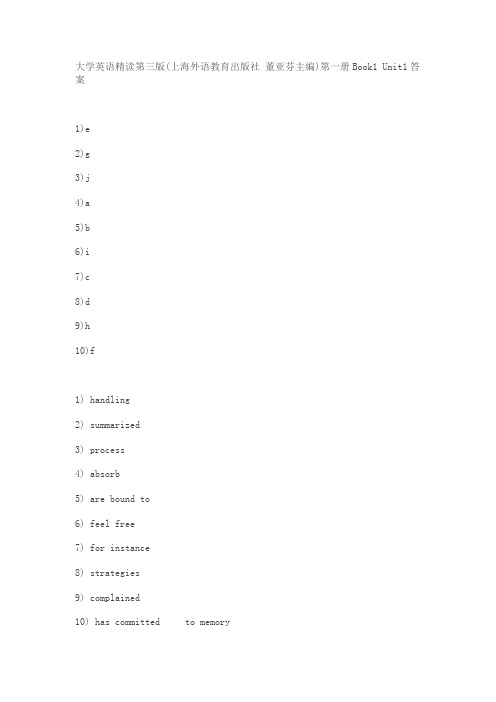
大学英语精读第三版(上海外语教育出版社董亚芬主编)第一册Book1 Unit1答案1)e2)g3)j4)a5)b6)i7)c8)d9)h10)f1) handling2) summarized3) process4) absorb5) are bound to6) feel free7) for instance8) strategies9) complained10) has committed to memory11) Nevertheless12) rely on13) Apart from14) command1) over and over again2) at a time3) put it into practice4) watching out for5) by no means6) concentrate on7) In addition t8) in detail1)action2)employ3)announce4)examination5)communication6)express7)compose8)improvement9)concentration10)management11)consider12)motivate13)development14)movement15)discuss16)operate17)division18)production19)educate20)repeat1) additional2) add3) addition4) addition1) effectively2) effect3) effective4) effect1) helpful2) help3) helpless4) help5) helplessly6) helpfully7) helpful1) reliant2) reliable3) reliance reliable4) relies5) reliably6)1) repetition2) repeating3) repeatedly4) repeated5) repetition1) In my opinion2) According to Mary3) In our opinion4) According to today's papers5) In most doctors' opinion According to most doctors1) Shakespeare was not only a dramatist but also an actor.2) Miss Crain not only took me home in her car, but also came the next day to see if I had recovered.3) Hainan Island attracts tourists not only in winter but also in summer.4) There is always a black market not only in Britain, but also in other European countries.5) At the Athens Olympics in 2004, Liu Xiang not only won a gold medal in the 110-meter hurdles, but also broke the Olympic record.1) It is true that your sentences are all grammatically correct, but they don’t make any sense.2) It is true that they lost that battle, but they still went on fighting.3) I t is true that Tom’s very clever and hardworking, but I still don’t think he is the right person for the job.4) It is true that learning English is by no means easy, but we can make the task easier by using some learning strategies.1) strategies2) frequently3) over and over again4) commit to memory5) acquaintance6) watch out for7) communicate8) process9) opportunities10) rely on11) put into practice12) absorbed1) if2) about3) it4) know5) up6) as7) addition8) even9) into10) other11) for12) while1) memorize2) a matter of3) taught4) shelf5) realize6) written7) idiomatic8) join in9) difference10) gain a good command翻译1) 史密斯太太对我抱怨说,她经常发现与自己十六岁的女儿简直无法沟通。
大学英语精读3教案

大学英语精读3教案教案名称:大学英语精读3教案教学目标:1. 匡助学生提高阅读理解能力,包括理解文章的主旨、细节和推理能力。
2. 培养学生的词汇量和语言表达能力。
3. 培养学生的独立思量和批评性思维能力。
教学内容:本教案将以大学英语精读3教材中的三篇文章为基础,分别是《The Benefits of Reading Fiction》、《The Power of Positive Thinking》和《The Importance of Cultural Awareness》。
教学步骤:一、导入(5分钟)1. 创设情境,引起学生对阅读的兴趣,例如分享一段有趣的故事。
2. 提问学生对于阅读的看法和意义。
二、预习(10分钟)1. 学生自主预习教材中的三篇文章,并标记出不理解的词汇和句子。
2. 学生根据自己的理解,提出一些问题,以便在课堂上讨论。
三、阅读理解(30分钟)1. 分组讨论:学生分成小组,每一个小组选择一篇文章进行深入讨论,并回答教师提供的问题。
2. 教师引导学生理解文章的主旨、段落结构和关键信息。
3. 教师解释不理解的词汇和句子,并匡助学生理解文章的难点。
四、词汇拓展(15分钟)1. 教师提供一些与文章相关的词汇,学生通过课堂讨论和举例的方式理解词汇的含义和用法。
2. 学生分组进行词汇游戏,巩固所学词汇。
五、语言表达(20分钟)1. 学生根据所学文章的内容,进行小组讨论,提出自己的观点和看法。
2. 学生展示自己的观点,进行辩论和交流,教师引导学生运用所学语言进行表达。
六、总结与反思(10分钟)1. 教师总结本节课的重点内容和学习收获。
2. 学生进行自我反思,回答教师提出的问题,例如:你对阅读有什么新的认识?你在本节课中遇到了哪些难点?你有什么需要改进的地方?教学评估:1. 教师观察学生在小组讨论和课堂表达中的参预度和理解程度。
2. 学生完成课后阅读理解题目,教师批改并赋予反馈。
教学资源:1. 大学英语精读3教材2. 阅读理解题目3. 词汇拓展材料4. 小组讨论和辩论的话题材料教学延伸:1. 学生可以通过阅读其他相关文章,拓宽自己的阅读素材和视野。
现代大学英语精读3(教师用书)
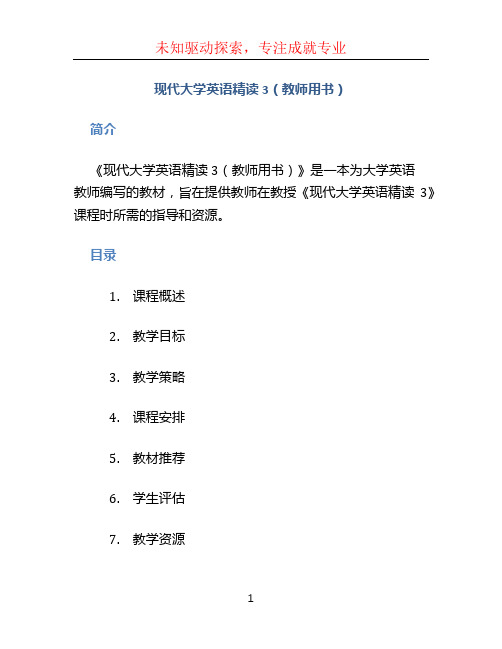
现代大学英语精读3(教师用书)简介《现代大学英语精读3(教师用书)》是一本为大学英语教师编写的教材,旨在提供教师在教授《现代大学英语精读3》课程时所需的指导和资源。
目录1.课程概述2.教学目标3.教学策略4.课程安排5.教材推荐6.学生评估7.教学资源1. 课程概述《现代大学英语精读3(教师用书)》是与《现代大学英语精读3(学生用书)》配套的教师辅助教材,为教师提供了详细的教学指导和资源。
本教材的主要目的是帮助教师更好地组织和教授《现代大学英语精读3》课程,以提高学生的阅读理解能力、拓展词汇量以及提升英语表达能力。
2. 教学目标本教材的教学目标主要包括以下几个方面:•培养学生的阅读理解能力,使其能够准确理解和分析文本;•提高学生的词汇量,通过词汇学习和拓展来扩大学生的词汇储备;•培养学生的独立学习能力,通过自主学习和讨论提升学生的学习自觉性和能动性;•提高学生的英语表达能力,注重口语和写作的训练,培养学生在英语方面的综合能力。
3. 教学策略教师在教授《现代大学英语精读3》课程时,可以采用以下一些教学策略:•创设情境,让学生在有趣的语言环境中学习;•使用多媒体辅助教学,例如利用录音、视频等资源增加学生的学习兴趣;•强调实践,通过课堂讨论、角色扮演等活动,提高学生的英语口语表达能力;•鼓励学生合作学习,开展小组讨论、团队作业等合作学习活动,培养学生的合作意识和团队精神。
4. 课程安排本教材建议将《现代大学英语精读3》课程分为若干单元,每个单元包含以下教学环节:1.预习:教师在课前指导学生预习相关的课文或话题,激发学生的学习兴趣。
2.导入:通过引入相关的话题或图片等方式,引导学生进入学习状态。
3.阅读:教师通过指导学生阅读课文,帮助学生理解文章的主要内容和要点。
4.分析:教师引导学生分析课文中的语言点、句型结构、词汇等,帮助学生深入理解文本。
5.讨论:鼓励学生参与课堂讨论,增加学生的口语表达机会,提供互动交流的平台。
大学英语精读3课文翻译全

Unit 1 A Brush with the Law一个青年发现,在大街上毫无明显目的地游逛会招致警方的责罚。
误会一个接一个发生,最终他只得出庭受审……与警察的一场小冲突我平生只有一次跟警方发生纠葛。
被捕和出庭的整个过程在当时是一件非常不愉快的事,但现在倒成了一篇很好的故事。
这次经历令人可恼之处在于围绕着我的被捕以及随后庭上审讯而出现的种种武断专横的情况。
事情发生在大约12年前,其时正是2月。
几个月前我中学毕业了,但上大学要等到10月。
当时我还在家中居住。
一天早晨,我来到里士满。
这里是伦敦的一个郊区,离我住的地方不远。
我在寻找一份临时工作,以便积些钱去旅游。
由于天气晴朗,当时又无急事,我便慢悠悠看看橱窗,逛逛公园。
有时干脆停下脚步,四处张望。
现在看来,一定是这种明显的毫无目的的游逛,使我倒了霉。
事情发生在11点半钟光景。
我在当地图书馆谋职未成,刚刚走出来,便看到一个人穿越马路,显然是要来跟我说话。
我以为他要问我时间,不料他说他是警官,要逮捕我。
起先我还以为这是在开玩笑,但又一个警察出现在我的面前,这次是位身着警服的,这一下使我确信无疑了。
“为什么要抓我?”我问道。
“到处游荡,企图作案,”他说。
“作什么案?”我又问。
“偷窃,”他说。
“偷什么?”我追问。
“牛奶瓶,”他板着面孔说道。
“噢,”我说。
事情原来是这样的,在这一地区多次发生小的扒窃案,特别是从门前台阶上偷走牛奶瓶。
接着,我犯了一个大错误。
其时我年方19,留一头蓬乱的长发,自认为是60年代“青年反主流文化”的一员。
所以我想装出一副冷漠的、对这一事件满不在乎的样子。
于是我尽量用一种漫不经心的极其随便的腔调说,“你们跟踪我多久啦?”这样一来,在他们眼里,我就像是非常熟悉这一套的了,也使他们更加确信我是一个地地道道的坏蛋。
几分钟后,开来了一辆警车。
“坐到后面去,”他们说。
“把手放到前排座位的靠背上,不准挪动。
”他们分别坐在我的两边。
这可再也不是闹着玩的了。
大学英语精读三电子教案
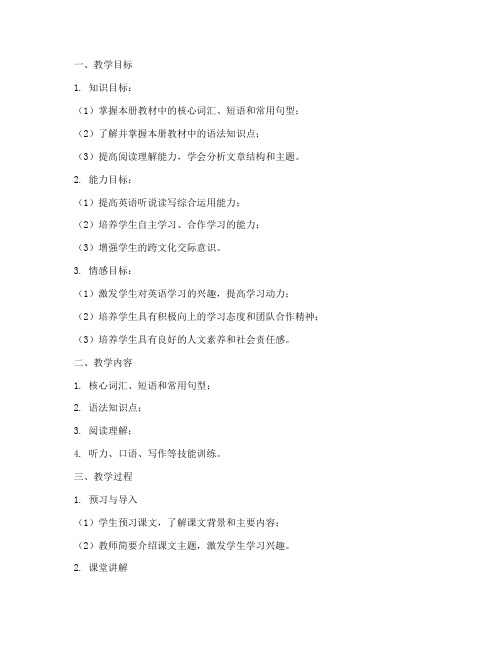
一、教学目标1. 知识目标:(1)掌握本册教材中的核心词汇、短语和常用句型;(2)了解并掌握本册教材中的语法知识点;(3)提高阅读理解能力,学会分析文章结构和主题。
2. 能力目标:(1)提高英语听说读写综合运用能力;(2)培养学生自主学习、合作学习的能力;(3)增强学生的跨文化交际意识。
3. 情感目标:(1)激发学生对英语学习的兴趣,提高学习动力;(2)培养学生具有积极向上的学习态度和团队合作精神;(3)培养学生具有良好的人文素养和社会责任感。
二、教学内容1. 核心词汇、短语和常用句型;2. 语法知识点;3. 阅读理解;4. 听力、口语、写作等技能训练。
三、教学过程1. 预习与导入(1)学生预习课文,了解课文背景和主要内容;(2)教师简要介绍课文主题,激发学生学习兴趣。
2. 课堂讲解(1)讲解课文中的核心词汇、短语和常用句型;(2)分析课文结构和主题,引导学生理解文章内容;(3)讲解语法知识点,帮助学生掌握英语语法。
3. 课堂练习(1)进行词汇、短语和句型练习;(2)进行阅读理解练习,提高学生的阅读能力;(3)进行听力、口语、写作等技能训练。
4. 小组讨论与合作(1)分组讨论课文主题,分享各自的观点;(2)进行角色扮演,提高口语表达能力;(3)进行小组写作,培养学生的写作能力。
5. 总结与反思(1)教师总结本节课的重点内容;(2)学生反思自己的学习情况,提出改进措施。
四、教学评价1. 课堂表现:包括学生的出勤、课堂参与度、回答问题情况等;2. 作业完成情况:包括作业的准确性、完整性、创新性等;3. 考试成绩:包括期中、期末考试等;4. 学生自评与互评:学生对自己的学习情况进行评价,并互相评价。
五、教学资源1. 教材:《大学英语精读(第三册)》;2. 课件:电子教案、多媒体素材等;3. 网络资源:英语学习网站、在线词典等;4. 教学辅助工具:投影仪、白板、录音笔等。
六、教学进度安排1. 第一周:课文讲解,重点词汇、短语和句型;2. 第二周:阅读理解,提高阅读能力;3. 第三周:听力、口语、写作等技能训练;4. 第四周:小组讨论与合作,提高综合运用能力;5. 第五周:总结与反思,调整学习方法。
大学英语精读3课文(第三版)_中英文对照
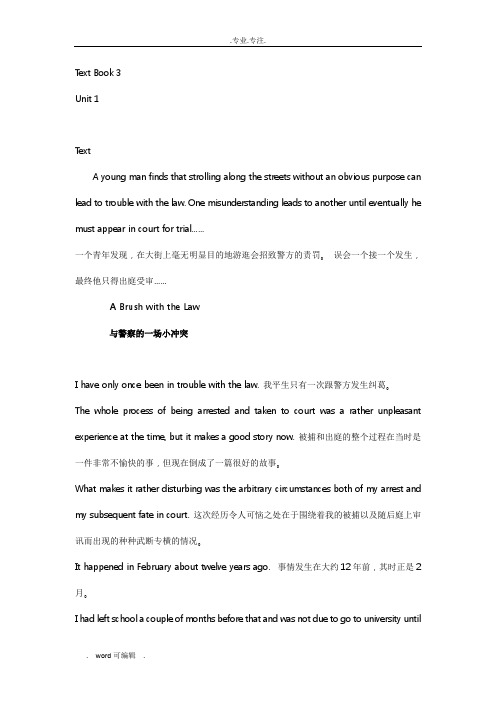
Text Book 3Unit 1TextA young man finds that strolling along the streets without an obvious purpose can lead to trouble with the law. One misunderstanding leads to another until eventually he must appear in court for trial……一个青年发现,在大街上毫无明显目的地游逛会招致警方的责罚。
误会一个接一个发生,最终他只得出庭受审……A Brush with the Law与警察的一场小冲突I have only once been in trouble with the law. 我平生只有一次跟警方发生纠葛。
The whole process of being arrested and taken to court was a rather unpleasant experience at the time, but it makes a good story now. 被捕和出庭的整个过程在当时是一件非常不愉快的事,但现在倒成了一篇很好的故事。
What makes it rather disturbing was the arbitrary circumstances both of my arrest and my subsequent fate in court. 这次经历令人可恼之处在于围绕着我的被捕以及随后庭上审讯而出现的种种武断专横的情况。
It happened in February about twelve years ago. 事情发生在大约12年前,其时正是2月。
I had left school a couple of months before that and was not due to go to university untilthe following October. 几个月前我中学毕业了,但上大学要等到10月。
- 1、下载文档前请自行甄别文档内容的完整性,平台不提供额外的编辑、内容补充、找答案等附加服务。
- 2、"仅部分预览"的文档,不可在线预览部分如存在完整性等问题,可反馈申请退款(可完整预览的文档不适用该条件!)。
- 3、如文档侵犯您的权益,请联系客服反馈,我们会尽快为您处理(人工客服工作时间:9:00-18:30)。
单选题第1题 (2.5) 分—Let’s have a party in our department.— _________ .A、All rightB、Good ideaC、Very goodD、I like第2题 (2.5) 分—Do you know what day is today?— ________ .A、Today is WednesdayB、It is a fine dayC、It is February 11D、It is raining第3题 (2.5) 分—When will the performance begin?— ________ .A、About one hourB、After one hourC、In one hourD、At one hour第4题 (2.5) 分I ________ for two hours but nobody has arrivedyet.A、am waitingB、waitedC、have waitedD、have been waiting第5题 (2.5) 分He walked into the office and shook hands with a smiling man ________ Mr.Black.A、namingB、namedC、by namedD、calling第6题 (2.5) 分The hostess ________ until the guests were seated.A、sat downB、was sitting downC、was to sit downD、didn’t sit down第7题 (2.5) 分If I ________ you, I ________ that job.A、was, would takeB、were, would takeC、was, would have takenD、were, would have taken第8题 (2.5) 分A friend of mine, after 10 years of studying ballet, succeeded ________becoming a dancer.A、inB、onC、withD、of第9题 (2.5) 分________ , he bought his wife a present.A、On his way to homeB、On his way homeC、In his way homeD、In his way to home第10题 (2.5) 分We are looking forward to ________ the Great Wallagain.A、visitB、visitingC、having visitedD、being visited第11题 (2.5) 分With her yellow hair, Jane is ________ girl as a fairy.A、as beautiful aB、as a beautifulC、as a more beautifulD、so a beautiful第12题 (2.5) 分John had six eggs. Mary added three, so now they all _____ to nine.A、equalB、areC、added upD、sum up第13题 (2.5) 分It is necessary that everything ________ ready by 6: 00 p.m.A、beB、will beC、shallD、would be第14题 (2.5) 分Tom as well as two of his classmates ________ invited to the party.A、wasB、wereC、hasD、are第15题 (2.5) 分As we were leaving, we saw the ________ man and his friends entering.A、red hairB、red-hairC、red-hairedD、red-hairing第16题 (2.5) 分The teacher had no idea ________ these two students argued about.A、whoB、whatC、thatD、why第17题 (2.5) 分;;Mercury freezes if it is cooled to ________ .</font></span></p>;;</span></font></font></span></p>;</p>A、a low too temperatureB、a too low temperatureC、too low temperatureD、too low a temperature第18题 (2.5) 分The difference was ________ cross theriver.A、where toB、how toC、what toD、which to第19题 (2.5) 分—These are the pictures we took during this trip.— _________ !A、Oh, what beautiful pictures they areB、Oh, how beautiful pictures they areC、Oh, what beautiful pictures are theyD、Oh, how beautiful pictures are they第20题 (2.5) 分—I wonder if I could take a few days off work.— ________ .A、I’m sure you could leave off workB、I should say a few days is no problemC、Why, what’s the matter with youD、No, you mustn’t go away第21题 (2.5) 分—I have never been to a Chinese village, have you?— ________ .A、Yes, I haven’tB、No, I haven’t eitherC、No, I haven’t tooD、No, I have第22题 (2.5) 分—My mother is ill. Could I leave tomorrow?— ________ .A、Good. You can goB、Quite well. Please leaveC、No problem. Please doD、Not bad, if you like第23题 (2.5) 分There are scientific ways ________ which man solves problems.A、 inB、withC、atD、on第24题 (2.5) 分According to ________ they have told me, they should return within about one week.A、thatB、itC、whatD、which第25题 (2.5) 分Only last week I called at________ .A、my auntB、my aunt’sC、my auntsD、mine aunt第26题 (2.5) 分—I left my umbrella in my room. Wait while I go back to get it.—________ .A、Don’t be afraid, it will be fineB、Never mind, the weather will be OKC、Don’t bother, it will clear up by noonD、No problem, you can go第27题 (2.5) 分—I lost my money.— _________ .A、Oh, you will be more carefulB、Oh, you must be more carefulC、Oh, you would be more carefulD、Oh, you should have been more careful第28题 (2.5) 分—Where shall we go this weekend?— ________ .A、What is having a drive to the countryB、How is to take a drive to the countryC、What about having a drive to the countryD、We’re having a drive to the county第29题 (2.5) 分He gave ________ answer as I did.A、as sameB、sameC、as the sameD、the same第30题 (2.5) 分The new employee finished the report and ________ .A、turned it inB、turned in itC、turned it upD、turned it on第31题 (2.5) 分The shop offers products that range ________ inexpensive to very expensive.A、betweenB、fromC、amongD、along第32题 (2.5) 分I’m very interested ________ plants, animals and geography.A、onB、toC、overD、in第33题 (2.5) 分The lake shone ________ glass in the moonlight and she _______ it verymuch.A、liking, likedB、liked, likeC、like, likedD、like, likes第34题 (2.5) 分I have no idea ________ he has said about thematter.A、whichB、thatC、whatD、how第35题 (2.5) 分Just for today, I’m not going to insist that everything I do ________ perfect.A、wasB、isC、beD、are第36题 (2.5) 分He was willing to do all ________ he could to help his friends.A、whichB、thatC、howD、what第37题 (2.5) 分She glanced shyly ________ him and then lowered hereyes.。
